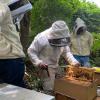Short-term Expert Support to Assess and Define Opportunities for Action in the Field of Solid Waste Management in the Caribbean (2021)
Solid Waste Management (SWM) is an increasingly urgent challenge for the Caribbean region. Each day, tons of solid waste are either burnt in the open air or discarded in open-air dumps, local waterways, or in the environment. Eighty-percent of marine litter in the Caribbean comes from land-based sources of solid waste, mainly plastics. The failure to better manage solid waste has grave public health and environmental impacts, as well as economic costs, not least given the importance of tourism to many of the region’s economies.
Forbes magazine declared the Caribbean islands as the largest per capita polluters in the world. SWM has been a moving target over the last decades1 , as the quality and composition of the waste stream has altered significantly since the late 1980s, while at the same time quantities have dramatically increased; solid waste has changed from the dense and almost completely organic waste associated with agricultural economies to the less biodegradable waste produced in industrialized economies. Recent studies conducted by UNEP2 project exponential growth (more than 60 per cent by 2025) in the generation of waste in the region, due to global trends such as population growth and increased urbanisation, increased per capita incomes, tourism and hospitality-related activities, along with unsustainable patterns of production and consumption characterizing a linear economy.
The Caribbean is the second most plastic-contaminated sea in the world after the Mediterranean Sea3 with estimations of the volume of plastic waste in this area ranging from 600 to 1,414 plastic items per square kilometre in different locations. In the Caribbean, as recorded in annual campaigns of marine litter collection from 2006 to 2012, the five materials with the greatest presence were: plastic drink bottles (19.6%), plastic and paper bags (16.9%), caps and tops (11.4%), utensils, dishes and glasses (9.6%), and drink glass bottles (6.7%).
While a diverse grouping of Small Island Developing States (SIDS), the countries targeted by the present assignment face certain common challenges in the implementation of sound, sustainable SWM. Growing urbanisation and rising consumption within linear economic patterns are multiplying the output of waste. As SIDS, the countries’ populations and territories are often dispersed and remote, rendering the logistics of waste processing challenging and costly. Meanwhile, at both the national and regional levels, no appropriate legislative framework, effective technical solutions or – crucially – holistic strategic planning have been developed to fully overcome these challenges.
Waste profiling is rather limited in the region due to the scarcity of data; a recent UNEP report4 (covering 8 Caribbean countries: Belize, Cuba, Dominican Republic, Haiti, Saint Kitts and Nevis, St. Lucia, St. Vincent and the Grenadines, and Trinidad & Tobago) highlights the opportunity for the region, and proposes a set of actions around efficient waste management that would enable the transition towards a circular economy model.
Area of interest: Grenada
Year: 2021




